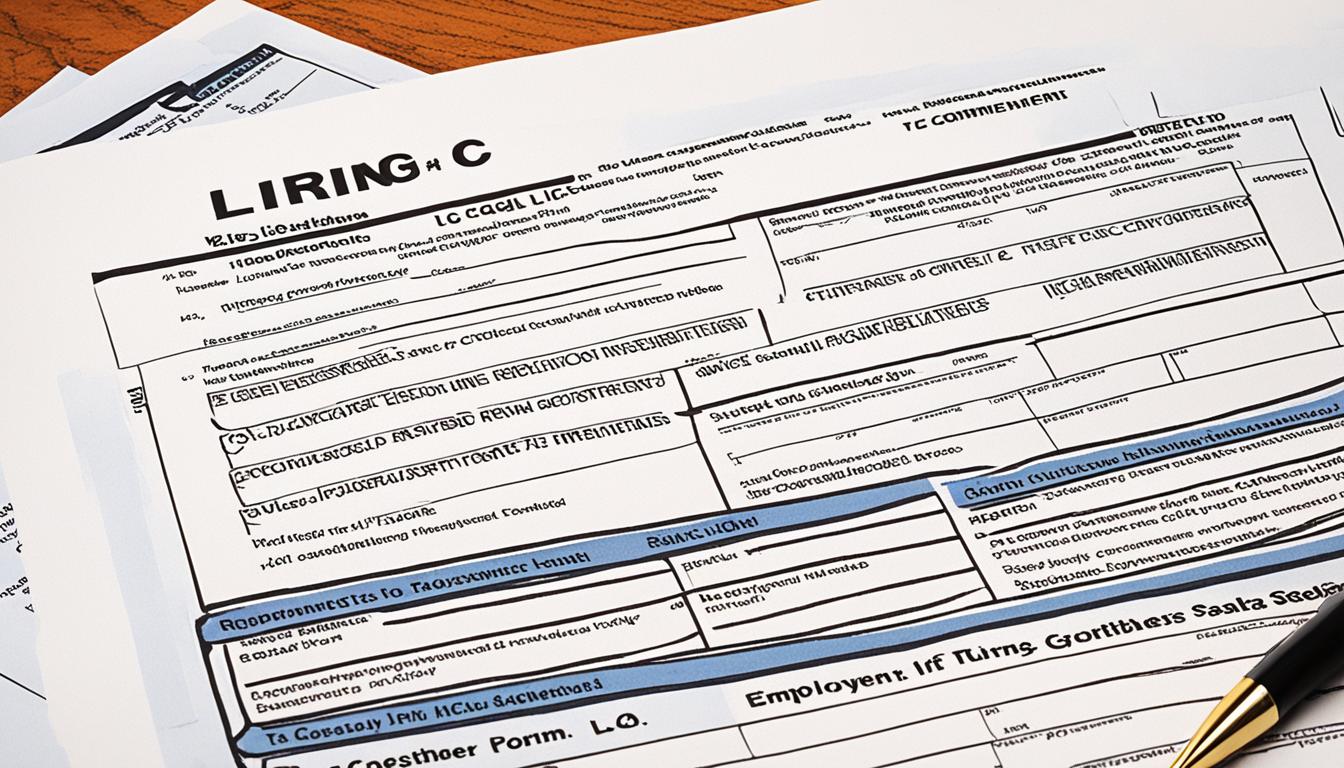Did you know that since 2009, a significant shift in the legal landscape for single-member LLCs occurred, mandating that any single-member LLC with employees must navigate the complexities of employment tax under the mantle of the company, not the individual owner? This pivot in hiring regulations for single-member LLCs underscores the growing responsibilities and intricacies of running what many consider the simplest business entity. As a single-member LLC considers employee hiring, it faces a legal framework that’s both protective and demanding, fueling the need for comprehensive understanding before expanding its workforce.
Key Takeaways
- Understanding the post-2009 employment tax responsibilities is critical for single-member LLCs with employees.
- Adherence to federal employment taxes for single-member/non-corporate LLCs is a legal imperative.
- New and converting LLCs often require a new Employer Identification Number (EIN), distinguishing business and owner.
- An EIN might not be necessary for single-member LLCs without employees or excise tax liabilities.
- Single-member LLCs offer limited liability protection and various tax options, separate from sole proprietorships, which provide no personal asset protection.
Understanding the Single-Member LLC Structure and Employment Eligibility
If you’re considering the formation of a single-member LLC or already operate one, understanding the nuances of its structure and employment eligibility is critical. A single-member LLC offers a blend of flexibility and protection, setting it apart from corporations and sole proprietorships. Let’s delve into what makes a single-member LLC unique, its staffing capabilities, and how it compares with other business entities.
What Sets a Single-Member LLC Apart from Corporations and Sole Proprietorships?
The single-member LLC structure offers limited liability to its owner, akin to a corporation, without the formality of board meetings and annual reports. Unlike corporations, however, a single-member LLC is not taxed as a separate business entity. Instead, all profits and losses are passed through to the owner’s personal tax return, steering clear from the double taxation typically associated with corporations. When comparing a single-member LLC vs sole proprietorships, the LLC provides an added layer of protection by separating personal and business assets, which isn’t the case with sole proprietorships.
Clarifying Misconceptions: Single-Member LLCs and Staffing Capabilities
Many entrepreneurs wonder about the employment eligibility of single-member LLCs and their staffing capabilities. Yes, single-member LLCs can hire employees, and significant changes since January 2009 have affected how these entities handle employment taxes. With the latest regulations, it’s the LLC, not the single owner, that’s responsible for payroll taxes. Previously, a sole owner might file and pay under their name and EIN. However, after January 1, 2009, single-member LLCs with employees must acquire a new EIN to comply with these regulations, bolstering the LLC’s role as a separate legal entity.
- Single-member LLCs responsible for employment taxes from January 1, 2009
- New EIN requirement for isolation of liabilities to the LLC
- LLCs can opt to be taxed as corporations or S corporations without a new EIN, provided they meet certain criteria
- Trusts and estates involving LLCs may require a new EIN under specific circumstances
To check whether your single-member LLC needs a new EIN due to these changes, it’s crucial to visit the official IRS guidelines. For more details on these requirements, you can refer to the employment eligibility of single-member LLC information provided by the IRS.
Equipped with this knowledge, you can better understand and leverage the advantages of a single-member LLC for your business endeavors. As you navigate the world of entrepreneurship, remember that even as a single owner, your LLC is equipped to grow through hiring, subject to the same scrutiny and standards applied to larger corporations.
Can a Single-Member LLC Hire Employees?
If you own a single-member LLC and are wondering whether you can expand your business by hiring employees, the answer is a definitive yes. Since the overhaul of Treasury Regulations in 2007, which took effect on January 1, 2009, the landscape for employee hiring for single-member LLCs has seen significant modifications. It’s paramount that you’re aware of the changes, especially regarding employment taxes and wage payments. Fortunately, this guide is designed to walk you through these updates and streamline your hiring process.
One critical aspect you should be aware of is the requirements surrounding Employer Identification Numbers (EINs). If your single-member LLC has not previously obtained an EIN, you’ll need one to handle federal employment taxes starting from the 2009 update. This is also the case if your single-member LLC undergoes a transformation into a multi-member LLC or opts for taxation as a corporation or S corporation. For detailed guidelines on this topic, refer directly to the IRS’s regulations.
However, not all situations call for a new EIN. For instance, if you’re converting an existing partnership to an LLC taxed as the same, or if your LLC does not have employees and no liability for excise taxes, a new EIN is not necessary. This can ease the transition for can a single-member LLC hire employees without the additional steps.
When dealing with trusts or estates, the requirements can become more complex. A new EIN is mandatory if a trust is formed with estate funds post-owner’s demise or if an estate is actively conducting business after the owner’s death. Similarly, for trusts, a new EIN is needed in scenarios such as a sole granter establishing multiple trusts or a living trust evolving into a testamentary one.
Importantly, not all changes within your LLC call for a new EIN. Adjustments to names or addresses of trustees, grantors, or beneficiaries do not necessitate an EIN update. The IRS has outlined situations where obtaining a new EIN is either mandatory or optional based on the nature of the change in your business structure.
In conclusion, if you’re planning on employee hiring for single-member LLCs, ensuring your EIN is in order is a crucial step. By understanding the regulations that have been in place since 2009, you can navigate the hiring process with confidence and compliance. Remember, these changes reflect the evolving business landscape and are aimed at supporting your ability to grow and thrive as a single-member LLC.

Acquiring an Employer Identification Number (EIN) for Your Single-Member LLC
When you’re considering the step of acquiring EIN for single-member LLC, it’s essential to understand both the how and the why. For those entering the world of business with a single-member LLC, it stands as an invaluable identifier for various legal and financial activities, especially if you’re planning to hire employees.
Step-by-Step Guide to Applying for an EIN
Applying for EIN for single-member LLC is a fairly straightforward process. To begin, here’s a breakdown of the essential steps you should follow:
- Identify the legal structure of your business. If you are operating a single-member LLC, this will be your selection.
- Authenticate the responsible party. Typically, this is you, the owner of the single-member LLC.
- Provide the necessary details of your LLC, including the name, address, and reason for applying for an EIN.
- Choose your preferred method of receiving the EIN confirmation, whether online or through traditional mail.
For most, applying online is the fastest option, with immediate processing times. However, if applying by mail, you may be waiting up to four weeks. Above all, ensure the information provided is accurate to avoid any unnecessary delays or complications.
Understanding the Necessity of an EIN When Hiring
The necessity of EIN for hiring in single-member LLC cannot be overstated. It’s a crucial element of legally operating your business, especially when changes occur, such as transitions from a sole proprietorship or if the LLC starts hiring employees. With 50 percent change in ownership, federal reporting adjustments, and potential tax classification changes, the need for an EIN becomes essential. It’s not only about complying with the IRS; having an EIN as a single-member LLC also facilitates business credibility, protection from identity theft, and ease in financial dealings.
- If ownership transfers reach or exceed 50 percent in a twelve-month period, a new EIN is likely required.
- Since January 1, 2009, single-owner LLCs not treated as corporations must report employment taxes differently.
- Liabilities for certain excise taxes fall on the LLC starting January 1, 2008, per the modifications to Treasury Regulations.
- An EIN is mandatory when a single-owner LLC elects to be taxed as a different entity, like a corporation or S corporation.
- Even if you don’t have employees, certain circumstances may still dictate the need for an EIN. Be sure to evaluate your business’s specific tax obligations.
Pricing for EIN acquisition services varies: ZenBusiness and LegalZoom offer free application services, exclusive of state fees, while Northwest Registered Agent charges a small fee. Regardless of the chosen provider, securing an EIN delivers a range of benefits including fraud protection and smoother operations for your business.
Finding and following the correct processes is crucial, particularly for international applicants, to ensure all your business activities are above board. In effect, prioritizing the acquisition of an EIN prepares your single-member LLC for future hiring, tax responsibilities, and an overall legitimate business presence.
Navigating Federal and State Hiring Regulations for a Single-Member LLC
As you delve into the world of entrepreneurship with your single-member LLC, it is crucial to understand both federal hiring regulations for single-member LLC as well as state hiring regulations for a single-member LLC. These rules not only guide how you bring on new team members but also ensure compliance, minimizing legal exposure and maximizing business integrity.

Fulfilling IRS Requirements for Employee Onboarding
When you are ready to expand your team, the Internal Revenue Service (IRS) sets out clear IRS requirements for employee onboarding that must be followed. One of the first steps is ensuring that every employee completes the mandatory Form I-9 to legally verify their eligibility for employment in the United States. It is a standard procedure for all U.S. employers, embracing both citizens and noncitizens alike.
Another cornerstone of employee data is the Social Security Number (SSN), an indispensable element employers must collect for tax purposes. Each SSN is required to be reported on Form W-2 — the wage and tax statement. Remember, an Individual Taxpayer Identification Number (ITIN), while vital for certain tax processes, starts with the number “9” and cannot replace an SSN for the purpose of employee identification or work authorization.
Your responsibilities also include keeping a Form W-4, Employee’s Withholding Certificate, for each team member, to accurately determine the amount of federal income tax you should withhold from their paychecks. It’s essential for employees claiming an exemption from income tax withholding to express this on their Form W-4, which should be updated annually. The IRS also provides a tax withholding estimator as an aid, yet it’s not a substitute for the Form W-4 and should be utilized alongside it.
Adhering to State-Specific Employment Laws and Workers' Compensation Rules
The complexity increases as one turns attention to state-specific employment laws for single-member LLCs. Each state may have a unique set of regulations pertaining to employment standards, such as minimum wage, overtime pay, and breaks. As a single-member LLC owner, keeping abreast of these local mandates is essential for a seamless operation.
In addition to standard employment laws, workers’ compensation rules for single-member LLCs constitute another layer of state-regulated requirements. Workers’ compensation insurance is often necessary and serves as a safeguard protecting both your employees and your business in the event of workplace injuries or illnesses. Understanding and adhering to these rules ensures not only legal compliance but also demonstrates a commitment to the well-being of your employees.
Becoming an employer means navigating a sea of regulations, but with attentiveness and due diligence, your single-member LLC can smoothly sail the waters of federal and state employment laws.
Growth Potential: Advantages of Expanding Your Single-Member LLC Workforce
As you explore the landscape of running your business, you might consider the tremendous advantages of expanding your single-member LLC workforce. Adding employees to your operations isn’t just about increasing numbers; it’s about strategically enhancing your business’s core competencies and driving growth. With employee turnover rates on the rise due to the “great resignation,” now more than ever is an opportune time to seize the productivity benefits of hiring employees to ensure your entity stays ahead of the curve.
Boosting Productivity and Business Scalability Through Employment
When contemplating expansion, you’re not just hiring staff, you’re essentially investing in your company’s future. A resilient team can see you through economic downturns, a challenge that family-owned businesses tend to navigate more successfully than their counterparts. Employment in your LLC ushers in fresh perspectives and specialized skills, necessary for adapting to evolving industry trends and local competition. It clears the pathway for scalability, enabling you to tackle bigger projects, diversify services, and explore new markets. Leveraging internal recruitment promotes morale and nurtures a culture of recognition, demonstrating that career opportunities and growth are available within your scalable business model.
Strategically Structuring Your Team for Maximized Efficiency
- Consider internal promotions, a strategy known for its time and cost efficiency, to fill leadership positions and bolster the expertise within your ranks.
- Embrace recruitment tools that streamline your hiring process, allowing you to home in on the latest skill sets and thus fostering internal development.
- A well-executed recruitment strategy that balances the retention of institutional knowledge with the infusion of new talent can spur innovation and drive your company toward unprecedented growth.
In sum, the strategic team structuring for single-member LLCs is not just about adding more people; it’s about crafting a powerhouse of skilled individuals who each play a critical role in your business’s journey to success. Whether it is leveraging the energy of the youth by hiring your children or tapping into the vast talent pool of experienced professionals, strategic employment is key to sustainable business growth.
Mitigating Risks: The Legalities of Single-Member LLC Employee Management
When diving into the world of single-member LLC employee management, you must be cognizant of the legalities to effectively mitigate potential risks. Being the sole member of an LLC doesn’t absolve you from adhering to the operating agreement, a critical document that specifies the framework for your business operations. Without such an agreement, you’re automatically subject to your state’s laws, which might not be tailored to your business’s best interests. This can be a particularly acute pain point when banks and investors require a glance at your operating agreement before considering financing options for your business endeavors.
Furthermore, the conflation of business and personal assets can blur without a distinct operating agreement in place, stirring the pot for financial entanglements, especially during audit situations. As you manage your single-member LLC, remember that establishing clear directives for handling profits and losses, delineating financial responsibilities, and setting forth dissolution protocols can shield you from future legal headaches. Should you find the prospect of drafting such documents daunting, legal counsel can streamline creating and certifying your single-member LLC operating agreement and ensure your personal assets are distinctly separated from your business, aligning with the desired legalities of single-member LLC employee management.
Keeping abreast of federal tax policies, like the IRS-mandated deferral of payroll taxes under Notice 2020-65, is essential for maintaining legal compliance. Failure to adhere to such guidelines can result in accruing penalties, which, as of May 1, 2021, include interest and additional taxes. Should these taxes remain unsettled, you might be subjected to a stringent 100% penalty, an infraction that can significantly impact any entity including your single-member LLC. As the landscape of tax legislation continues to evolve, with provisions in the CARES Act facilitating the deferral of employer Social Security taxes, your diligence in managing these fiscal responsibilities is imperative to minimize the risks of single-member LLC employee management.




